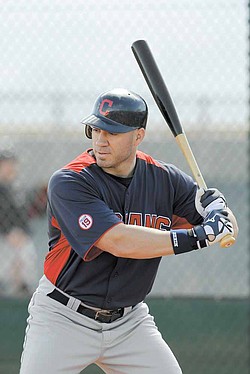Hafner ready for 2011 rebound
ASSOCIATED PRESS
Cleveland Indians' Travis Hafner stands in against live pitching during baseball spring training Monday, Feb. 21, 2011, in Goodyear, Ariz.
By Paul Hoynes
The Cleveland Plain Dealer
GOODYEAR, Ariz.
Travis Hafner remembers what it felt like to be short to the ball and long through it.
“It’s what every hitter strives for,” said Hafner.
Short to the ball means a short, quick swing. Long through it means keeping the bat in the strike zone for so long it can to be timed by a sun dial. It allows hitters to use the whole field and drive the ball a long way.
Hafner lived with that swing from 2004-07. He hit .296 with 127 homers and 434 RBIs for those four years. He averaged 32 homers and 109 RBIs a season. His OPS in 2005 and 2006 was over 1.000. It’s why he’s making $13 million this year and $13 million next year in the final two years of the biggest contract in team history. It’s why the Indians named the second deck in right field at Progressive Field “Pronkville” in his honor.
Then the big years stopped and Hafner’s right shoulder started to hurt. He missed most of the 2008 season because of it. He had surgery after the year and he’s been searching for that swing ever since.
“The past couple of years I don’t get the same extension through the ball,” said Hafner. “But I think we’re in a pretty good spot with that right now. I’m ready to go.”
Hafner was able to put in a full offseason of training this winter. He lifted weights and swung the bat much more than he’s been able to do since the surgery. He called it a normal off-season, but couldn’t remember the last time he’d had one.
Hitting coach Jon Nunnally spent a lot of time at Hafner’s home in Avon Lake, where in a batting cage in the basement Nunnally tried to improve Hafner’s swing.
“We were able to work on some things,” said Hafner. “I feel like the swing made some improvement. I’ve continued to work on it this spring. I’ve just got to take it into games.”
Hafner said he’s developed bad habits over the last few years. To compensate for his shoulder, he started using his body more, while ignoring his hands, which generated bat speed. Soon it was the only swing he knew.
“When you’re weak on one side, you compensate, but pretty soon the pieces fall apart,” said Nunnally. “Now Travis is building himself back up to the point where he’s hitting the ball all over the field. He’s going to be all right.”
The swing hasn’t been Hafner’s only problem. He’s been unable to stay on the field. His shoulder tires and it’s hard for him to play more than three or four consecutive games. A designated hitter who can’t swing the bat every day is a bad match.
Managing Hafner can be tricky because of that. When to play him and for how long is a challenge. Manny Acta found a formula that worked last year. After coming off the disabled list on Aug. 14, Acta kept Hafner on a four games on, one game off program. Hafner responded by hitting .302 (38-for-126) with four homers and 17 RBIs in his final 36 games of the season.
Hafner played 118 games last year, his most since playing in 152 in 2007. He said he’d like to play at least 140 this year, but Acta is going to be cautious.
“We’re going to have to monitor his volume,” said Acta. “Throughout camp, we’ll get a better feel for how he is physically.”
Nunnally said if Hafner can stay on the field for the entire season, there’s no reason he can’t hit 20 to 25 homers. He hasn’t hit more than 16 in one season since his surgery.
“I feel good now,” said Hafner. “The test is always when you start playing every day and swinging the bat everyday. ... I feel I did everything I can this offseason for my shoulder to be as good as it can.”
Last year, Hafner hit .278 (110-for-396) with 29 doubles, 13 homers and 50 RBIs. The 29 doubles were the most he’s hit since 2006, but he did not take that as a sign that his power was returning.
“To me, you develop power by being consistent with your swing — by hitting the ball consistently on the barrel,” he said.
Can Hafner, at 33, still do that? Can he reach back in time and rediscover his lost swing and power?
“I feel like I can do that,” he said. “The big thing right now is getting consistent in my swing and taking it into the game.”
 43
43

